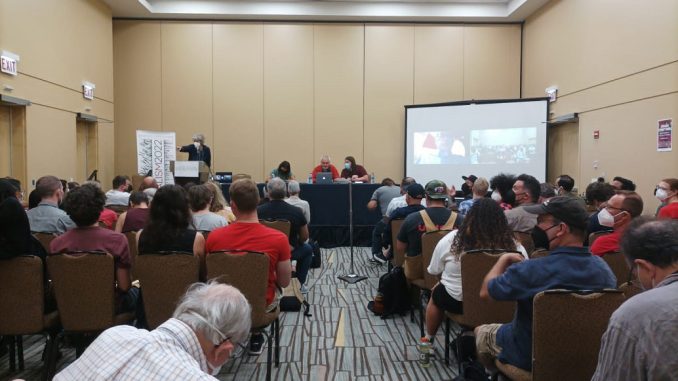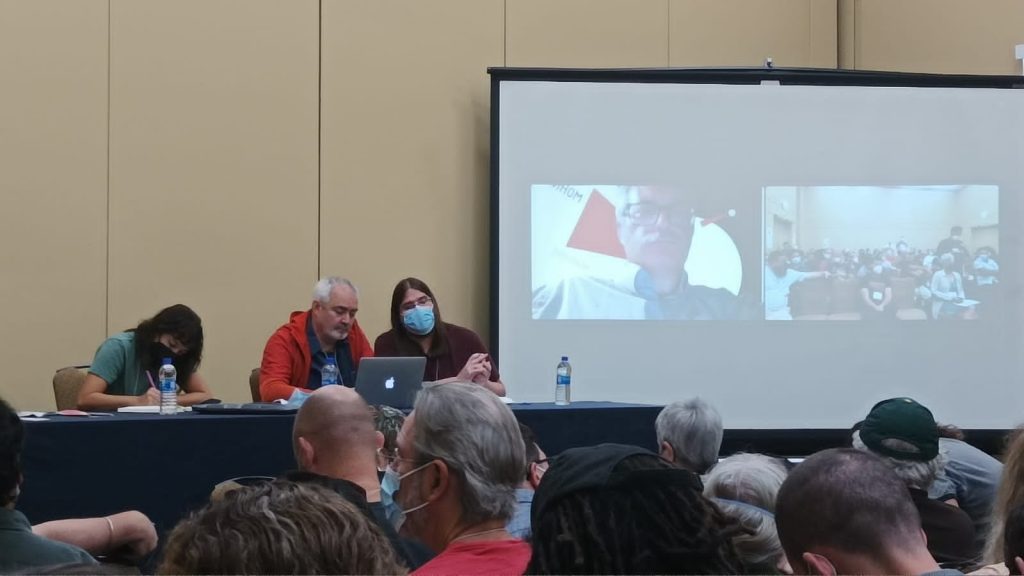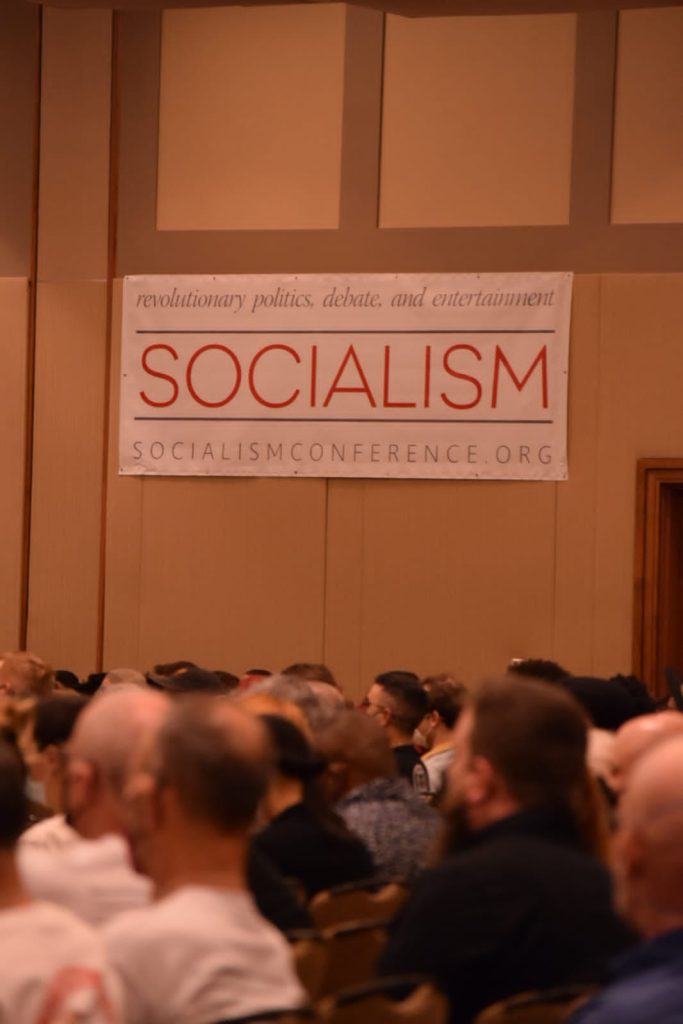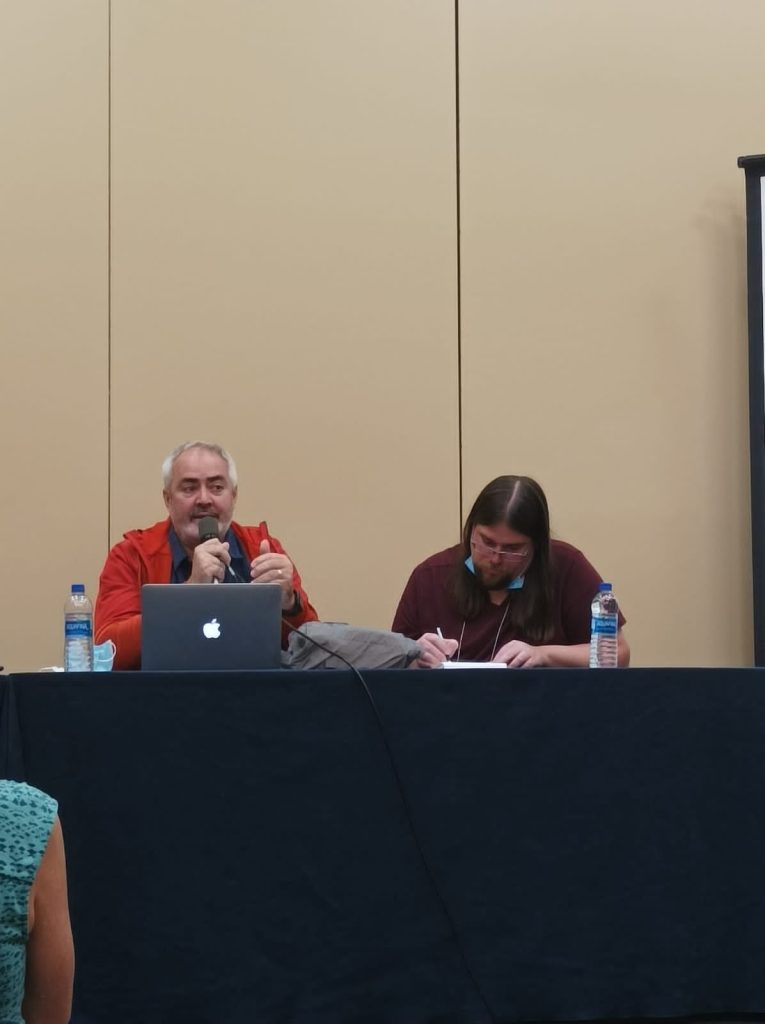
By: Luis Meiners
Socialism 2022 took place in Chicago on September 2-5. This edition of the conference was the first in person since the pandemic. More than 1,500 socialists from across the United States came together to debate and organize. Socialism 2022 displayed the energy that the socialist movement has and also its challenges and strategic debates.
The Socialism conference has been an important milestone for the left in the US for decades. For most of its history, it had the ISO among its main promoters, but since the dissolution of that organization in 2019, its continuity has been guaranteed by several organizations, among which the effort of Haymarket publishing stands out. The mere fact of keeping this space going is in itself a very positive point.

The moment
The political context is clearly different from that of the last in-person edition of the conference in 2019. That year was marked by the climate of resistance and struggle against Trump and the expectation for the 2020 Sanders campaign, with a DSA that had been growing very quickly. Now, the conference was marked by the experience of the 2020 electoral cycle and the anti-racist rebellion, both processes that showed the limits of the dominant strategic orientation within the DSA. This has generated a crisis in that organization, whose leadership has moved significantly to the right. The adaptation of Sanders and other progressive electoral figures to the Biden administration and the Democratic Party are proof of the lack of prospect in the electoral scene. This generates a vacuum of orientation for the DSA and a descent in participation in its internal life, deepening bureaucratic tendencies.
On the other hand, as the conference demonstrated, an important activism emerged from the 2020 rebellion. Added to this are also a large number of activists mobilized for the fight in defense of abortion rights and sexual and reproductive rights, as well like the rights of trans people and all the LGBTIQ community that is under attack by the reactionary right in various parts of the country. Finally, there is also the resurgence of working class activism that has as its milestones in the unionization campaigns at Amazon and Starbucks, but extends beyond.
The conference and some debates
This political moment and the strategic debates that accompany it were reflected in the conference. In the first place, in the very composition of the conference, multi-racial and with an important percentage of young people. According to the organizers, about 75% of the participants attended Socialism for the first time, which can be interpreted as an indicator of the presence of activism that emerged in the last period.
Second, it was reflected in the panels themselves. One aspect of this was the significant presence of panels that we can broadly identify with abolitionist perspectives. A large part of these focused on the struggle against racism and against the police and the institutions of the repressive apparatus. Many of these panels were organized by groups that emerged in the heat of the struggles against systemic racism that have been one of the fundamental aspects of the social struggles of the last decade. Socialist feminist perspectives also had an important presence, along with meetings to organize the struggle in defense of reproductive and sexual rights.
Another important part of the panels reflected the debates around the orientation of the DSA, the balance sheet of the last period and the tasks of the left. This included panels organized by sections of the DSA leadership that deepened its turn to the right, arguing for the need to vote Democrats against the reactionary and “fascist” threat of the Republicans. An interesting aspect was that this type of argument developed by some panelists met resistance among the attendees, and important debates took place, showing that an important part of the public was to the left of these panels.
Regarding the debates on the tasks of the left, it is important to highlight the participation of Tempest, a publication and revolutionary organizing project in which I participate. In different panels and debates, Tempest developed a revolutionary socialist perspective, and an orientation focused on struggles from below, and the need for revolutionary organization. It gave a clear counterpoint to the electoralism and lesser-evilism that tailed the Democratic Party, explaining the historical role of that party and defending class independence. Inviting, at the same time, to reflect on the ways to build a socialist organization that can live up to the challenges of the present, avoiding both opportunist reformism and sectarianism.
International debates and the participation of the ISL
Other debates that were expressed in the conference revolved around international issues. While there was a common starting point of general opposition to US imperialism and NATO, there were important debates with the campists. The Russian invasion of Ukraine was one of the high points of these debates, with some minority expressions of support for Russia and important expressions of solidarity with the resistance of the Ukrainian people. There were also discussions on China, and accounts of working-class struggles within the emerging power. Finally, in line with its recent adherence to the Sao Paulo Forum, the international committee of the DSA organized a panel focused on support for Lula and the Latin American “progressivisms”, showing that reformism and lesser-evilism lead to support for forces and governments that have frustrated the energies of change in the Latin American continent.
The International Socialist League was present at the panel “The revolutionary organization today: an international perspective” sponsored by Tempest. Alejandro Bodart, coordinator of the ISL and the MST of Argentina, spoke in this panel, together with Natalia Tylim from Tempest, and Andreu Coll from Anticapitalistas (Estado Español) and the USFI. This panel sought to address the opportunities and challenges of building revolutionary organizations in a period marked by the 2008 crisis, polarization and rebellions, within which there were also important crises in different revolutionary organizations. Alejandro marked the key importance of international organization, underlining the impossibility of overcoming the problems and challenges of revolutionary organization on a national scale. In this sense, he highlighted the need to build an international that can unite different traditions of the revolutionary movement based on a revolutionary program, with an insurrectionary strategy, without sectarianism or opportunism where differences and debates can coexist but at the same time are oriented towards intervening in reality, not just making propaganda. Also the need to take stock of the intervention of the revolutionary left in the last period, particularly in the face of the new phenomena of reality such as the broad parties that emerged in the heat of the crisis. A sector of the left acted with sectarianism, refusing to intervene. While another acted opportunistically, even dissolving into those parties, and abandoning the strategy of building a revolutionary party. These errors delayed the construction of the revolutionary alternative. Faced with this dilemma, Alejandro marked a different position, starting from seeing the need to intervene in these processes, but without abandoning the strategy of building revolutionary organizations, knowing that all these broad formations have an expiration date since the reformists will, rather sooner than later, capitulate to the regime. He also added that this type of formation is not on the rise at the moment. Finally, Alejandro called for the unity of all those who share this perspective.


Moving Forward
Overall, the Socialism 2022 conference demonstrated that there is significant energy in the socialist movement in the US. New layers of activists keep coming, bringing with them new perspectives and debates. At the same time, it could be seen that there are important debates about the orientation and tasks of the socialist left in this period.
In this framework, the pending challenge is to build a revolutionary organization that can give an organizational expression to this movement, and that allows all the necessary debates to take place in depth. An organization that can prevent the strength and rebellion expressed by the thousands of activists from dissipating. This is the key task of the moment.








